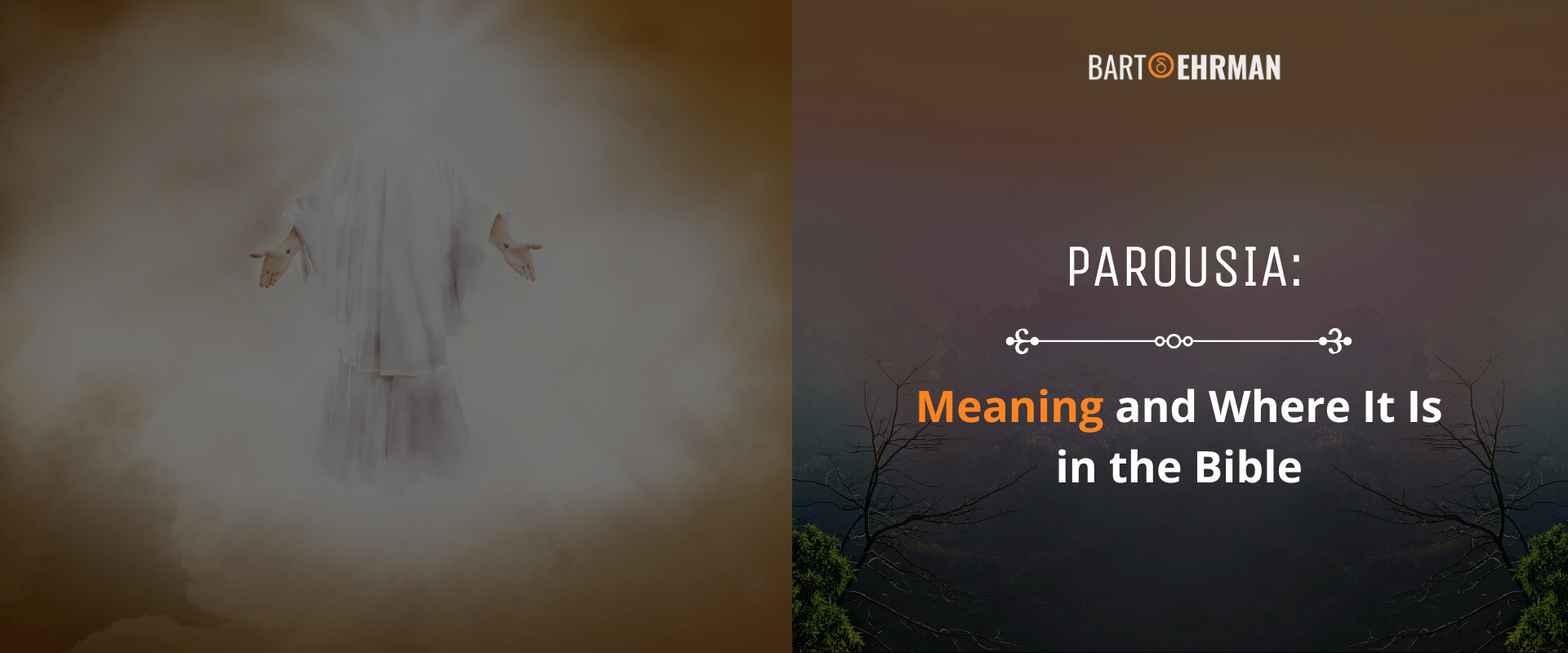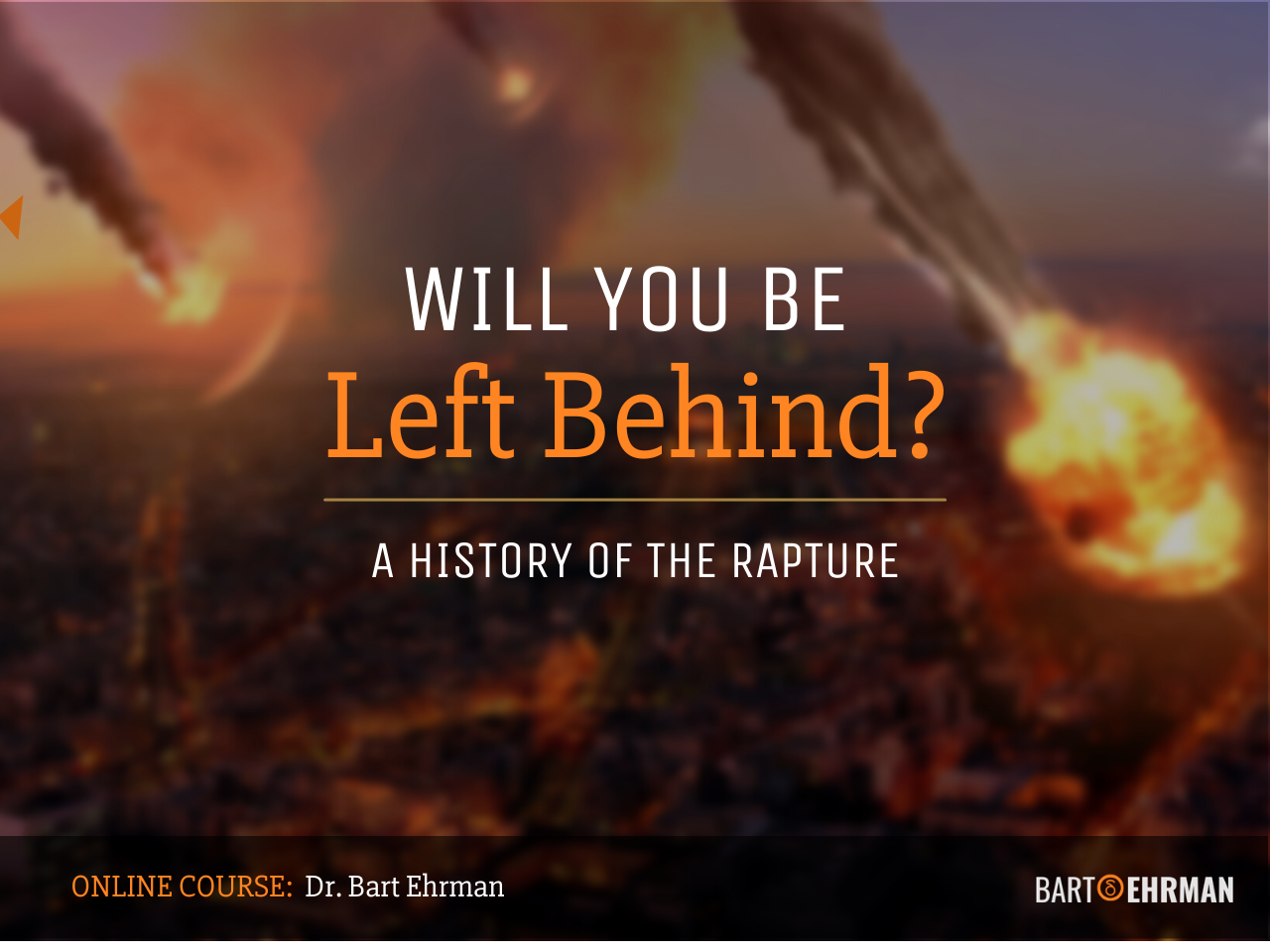Parousia: Meaning and Where It Is in the Bible

Written by Joshua Schachterle, Ph.D
Author | Professor | Scholar
Author | Professor | BE Contributor
Verified! See our editorial guidelines
Verified! See our guidelines
Edited by Laura Robinson, Ph.D.
Date written: November 10th, 2024
Disclaimer: The views and opinions expressed in this article belong to the author and do not necessarily match my own. - Dr. Bart D. Ehrman
The word parousia is deeply embedded in Christian theology, but its meaning and usage have evolved over time. This transformation of this word from a general concept to a defining feature of Christian eschatology marks a significant development in Christian thought.
In this article, I’ll explain the etymology of the word parousia, its appearances in the Bible, and the way it has shaped Christian views on the end times. I’ll also look at the predictions surrounding this event and how these beliefs continue to influence Christian thought and the wider culture today.

Parousia’s Meaning and Scriptural References
Parousia is a Greek word made up of two elements: para is a Greek prefix meaning “beside or near” and ousia means “being or essence.” The combination of these two results in parousia, the most literal meaning of which is “presence,” although it was also used to mean “arrival.” This second meaning evolved in early Christianity to refer to the Second Coming of Jesus.
The word is not found in the Septuagint, the Greek translation of the Hebrew Bible. However, it occurs 24 times in the New Testament, although not all of these refer to Jesus.
For example, parousia is sometimes used merely to contrast a person’s presence to their absence. Paul uses it this way in Philippians 2:12 when he writes
Therefore, my beloved, just as you have always obeyed me, not only in my presence (parousia) but much more now in my absence (apousia), work on your own salvation with fear and trembling.
Other verses use the word in the mundane sense of “arrival”, such as this brief reference in 1 Corinthians 16:17 where Paul writes “I rejoice at the coming (parousia) of Stephanas and Fortunatus and Achaicus” (see also 2 Cor 7:6, 7; 10:10; Phil 1:26; 2:12). Again, the use of the word exclusively for the Second Coming, that is, THE Parousia, had not yet happened in Paul’s time.
Nevertheless, the other 18 instances of parousia in the New Testament all have eschatological associations. Eschatology, by the way, is theology about the end of the world. One interesting example found in 2 Thessalonians 2:9 actually uses it for the arrival of the “man of lawlessness,” often identified as the Antichrist: “The coming (parousia) of the lawless one is apparent in the working of Satan, who uses all power, signs, lying wonders…”.
All the rest of the NT occurrences of parousia refer to Christ. In Matthew 24:3, for instance, Jesus’ disciples ask him “Tell us, when will this be, and what will be the sign of your coming (parousias) and of the end of the age?” Further on in Matthew 24:27, Jesus says “For as the lightning comes from the east and flashes as far as the west, so will be the coming (parousia) of the Son of Man.” Likewise, James 5:7 says “Be patient, therefore, brothers and sisters, until the coming (parousias) of the Lord.”
Interestingly, none of the references in the NT call Jesus’ Parousia the “Second Coming.” Our first Christian reference to this phrase comes from the 2nd century in a text called “Dialogue with Trypho” by Justin Martyr:
Of these and such like words written by the prophets, O Trypho, some have reference to the first advent of Christ, in which He is preached as inglorious, obscure, and of mortal appearance: but others had reference to His second advent (dutera parousia), when He shall appear in glory and above the clouds.
There are also several NT terms related to parousia. One is the Greek word apokalypsis meaning “uncovering” or “revealing.” In 1 Corinthians 1:7, Paul writes that Christians “wait for the revealing (apokalypsin) of our Lord Jesus Christ.” This word is also the traditional title of the book of Revelation in Greek, derived from the first phrase of the book, “The revelation (apokalypsis) of Jesus Christ.”
Another related term in the NT is epiphaneia, meaning “appearance” or “manifestation.” In 1 Timothy 6:14, the author, likely someone writing in Paul’s name, writes that his addressee should “keep the commandment without spot or blame until the manifestation (epiphaneias) of our Lord Jesus Christ.” This term was often used in ancient Greek to signify the visible manifestation of a god, so the connotation here is both that Jesus will appear and that he is divine.
Finally, there is the term phanerō which, when used as a passive verb, means “to be revealed or manifested.” We see this term used in Colossians 3:4 when the author writes that “when Christ who is your life is revealed (phanerōthē), then you also will be revealed with him in glory.”
Failed Predictions of the Parousia
The earliest Christians believed that the Parousia was imminent. In our earliest Christian document, 1 Thessalonians, Paul addresses a community of former pagans whom he’s converted. It’s clear from the letter that they are anxious. Though Paul has told them that Jesus could return any minute now, they are still waiting (1 Thessalonians was written around 50 CE, only 20 years after Jesus’ death). The Thessalonians are, thus, afraid that the members of their community who have died will miss out on the Parousia and its resulting salvation. Paul assures them this is not the case.
Furthermore, Rizwan Ahmed notes that Jesus’ own preaching in the Synoptic Gospels is clearly apocalyptic. In several verses, he says that the end of the world, and, thus, his Second Coming, will happen before his generation passes. In Mark 1:9, for example, he says “Truly I tell you, there are some standing here who will not taste death until they see that the kingdom of God has come with power.” Similarly, in Mark 14:62, when the high priest asks if he is the Son of God, Jesus says “I am; and you will see the Son of Man seated at the right hand of the Power and coming with the clouds of heaven.” While we can’t know for certain if Jesus said this, we can certainly say that the authors of the Synoptic Gospels believed it.
That didn’t happen in Jesus’ generation, of course, but Christians generally maintained faith in the Parousia. When the emperor Constantine convened the Council of Nicaea in the 4th century, a creed was formed which said in part that Jesus “ascended into heaven and is seated at the right hand of the Father. He will come again in his glory to judge the living and the dead, and his kingdom will have no end.” Note that while it says Jesus will return, no time is mentioned.
By the way, it isn’t only Christians who await Jesus’ return. Muslims also believe Jesus will come back, although they differ on the significance of it. For them, Jesus was a prophet to be honored, like Moses and Muhammed, but not divine. A verse in the Quran says that Jesus was not actually killed on the cross but instead “Allah raised him to Himself,” not unlike the biblical Enoch and Elijah. In a hadith, a saying of the prophet Muhammed outside the Quran, Muhammed says of the Judgment Day that “The Hour will not be established until the son of Mary (i.e. Jesus) descends amongst you as a just ruler.”
In the centuries since then, there have been many failed predictions of Jesus’ Parousia. I’ll highlight just a few here.
In the 3rd century, a Christian author named Hippolytus of Rome (170-235 CE) predicted that the Parousia would occur in the year 500 CE. Based on his reading of the book of Daniel, he said that 6,000 years since the creation of the world had to pass before Jesus would return. Since he believed that creation happened 5,500 years before Christ, Christ would return in the year 500.
In The Last Days Are Here Again: A History of the End Times, Richard Kyle writes that in the Middle Ages, an Italian monk and theologian named Joachim of Fiore (1135- 1202) said Jesus would return and reign for 1,000 years — an idea known as millennialism — beginning in the year 1260.
(Affiliate Disclaimer: We may earn commissions on products you purchase through this page at no additional cost to you. Thank you for supporting our site!)
In Apocalypses: Prophecies Cults and Millennia, Eugen Weber writes that Italian Renaissance painter Sandro Botticelli (1445-1510) believed, based on contemporary interpretations of the book of Revelation, that he was living in the time of the Great Tribulation, a period of intense worldwide suffering that was to come before the end of the world. Since it was the middle of the year 1500, Botticelli predicted that Christ’s millennial reign would begin three and a half years later, in 1504.
In Millennium Prophecies, Stephen Skinner writes of self-proclaimed British prophet Joanna Southcott (1750-1814) who, at the age of 64, claimed to be pregnant with the Christ child, a very different interpretation of the Parousia. She also claimed he would be born on Christmas Day, 1814. However, Southcott actually passed away on that day. An autopsy then proved that she was not pregnant.
Finally, in her own 1973 book The Call to Glory, astrologer and alleged psychic Jeanne Dixon claimed that the battle of Armageddon mentioned in Revelation 16 would occur in 2020, after which Jesus would return to defeat the Antichrist, Satan and the False Prophet between 2020 and 2037.
This is only four of the many, many failed predictions of the Parousia. Self-proclaimed prophets are no doubt continuing to make them now.

Impact the Parousia on the World Today
Belief in the Second Coming is a tenet of most denominations of Christianity, even today. However, there is clearly a diversity of opinion on this topic, even within denominations that technically believe it.
For example, in a 2010 survey by the Pew Research Center, about 40% of Americans claimed to believe that Jesus will return by the year 2050. Breaking these results down, 58% of white evangelical Christians believed this, as well as 32% of Catholics and 27% of white mainline Protestants. Those percentages are relatively small and may simply indicate that the rest of those communities believe the Parousia will come later than 2050.
One dissenting Christian opinion comes from the Center for Progressive Christianity, where an author named Peter E. Lewis writes “The Second Coming of Christ is an erroneous idea that developed among Christians in the last third of the first century AD.” He goes on to write that
In Galatians 2:20, Paul said, “Christ lives in me.” Actually, he lives in everyone who believes. With Christ in their hearts, Christians are in the kingdom of God, and their task is to increase the kingdom. When times are bad, and wars are raging, their response should not be to pray for a Second Coming but to be Christ in the world.
There have also been numerous books and/or films about the Second Coming. The best-known is the Left Behind series of novels and films by Tim LaHaye and Jerry B. Jenkins, released between 1995 and 2007. They, in turn, were inspired by Hal Lindsey and Carol Carlson’s 1970 bestselling book The Late Great Planet Earth. Among other specifics, Lindsey and Carlson claimed that the Second Coming would happen no later than 1988.
Beyond just affecting the culture, however, in a recent study by Simon Dein, we saw the impact the COVID-19 pandemic had on some Christians:
Revelation describes four horsemen of the Apocalypse who appear when the seven seals are opened. The first symbolizes Christ. The second represents war and bloodshed. The third is identified with famine and the fourth is associated with pestilence and death. Some Christians claim that COVID-19 is proof that the plagues of the book of Revelation, and in particular the seven Seals of Revelation 6:1–8:1, are occurring now and Jesus’ return is imminent.
In another study on this topic, during the COVID-19 pandemic, white Evangelical Christians were found to represent almost a third of unvaccinated adults in the U.S. Specifically, the study found that “common reasons for vaccine hesitancy specifically relevant among Evangelical Christians are that vaccines interfere with divine providence.”
Additionally, in a 2003 opinion piece in the Los Angeles Times, Bart Ehrman wrote about how belief in the imminent Parousia as interpreted from the book of Revelation was affecting people’s opinions on climate change.
He notes that although “biblical scholars have long recognized that the book was written for a 1st-century audience with 1st-century concerns about the 1st-century Roman Empire,” many Christians continue to believe it was written about the 21st century. This may have a disastrous effect on efforts to stem climate change because, as Ehrman writes,
If a significant portion of the voting public believes the end of our civilization is just 40 years off, why worry about the environment? Why support the Paris climate agreement to reduce greenhouse gas emissions to zero by 2050? It’s no surprise that believers in the Second Coming are significantly more likely to oppose governmental attempts to fight climate change.
Conclusion
Parousia is a Greek word which literally means “presence” or “arrival.” Over time, the word came to indicate the belief that Jesus would return, ushering in the end of the corrupt world and the beginning of the Last Judgment.
The word occurs 24 times in the New Testament, six of which carry the ordinary meaning of the arrival of a person. However, the other 18 occurrences all pertain in some way to eschatology, the theology about the end of the world. Other Greek words for this idea in the New Testament include apokalypsis, or “revealing” and epiphaneia or “manifestation.”
It’s clear that Paul and many of the earliest Christians believed that Jesus would return in their lifetimes. In fact, it’s likely that Jesus believed this as well. When this didn’t happen, scores of future Christians strained to predict the day of the Parousia. So far, none of these have come true, but in 1946, New Age guru Alice Bailey of the Theosophical Society predicted that Jesus would return in 2025. We shall see.
Finally, belief in the Second Coming has had some real-world effects in our own time. Many who believe the Second Coming is imminent feel that action on climate change is useless since the world will soon end. In addition, a large number of these same believers accepted the COVID-19 pandemic as a sign of the impending end of the world, and therefore, refused to be vaccinated. These examples show that religious ideas, right or wrong, can have real consequences.

